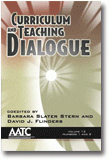
Curriculum and Teaching Dialogue
Vol. 12 # 1 & 2
Edited by:
David J. Flinders, Indiana University
A volume in the series: Curriculum & Teaching Dialogue. Editor(s): Chara Haeussler Bohan, Georgia State University. John L. Pecore, University of West Florida. Franklin S. Allaire, University of Houston-Downtown.
Published 2010
Curriculum and Teaching Dialogue is the journal of the American Association of Teaching and Curriculum (AATC). An important historical event in the development of organizations dealing with the scholarly field of teaching and curriculum was the founding of the AATC on October 1, 1993. The members of the AATC believed that the time was long overdue to recognize teaching and curriculum as a basic field of scholarly study, to constitute a national learned society for the scholarly field of teaching and curriculum (teaching is the more inclusive concept; curriculum is an integral part of teaching-the "what to teach" aspect). Since it's founding AATC has produced scholarship in teaching and curriculum and serves the general public through its conferences, journals, and the interaction of its members. The purpose of the organization was originally defined in Article 1, Section 2 of the AATC Constitution: "To promote the scholarly study of teaching and curriculum; all analytical and interpretive approaches that are appropriate for the scholarly study of teaching and curriculum shall be encouraged." Curriculum and Teaching Dialogue seeks to fulfill that mission.
CONTENTS
Acknowledgments. Presidents’ Message, David Callejo-Perez. Editor’s Notes: Looking Towards the Future, Barbara Slater Stern. VOLUME 12, NUMBER 1. Teaching In and For Democracy, William Ayers. Why I am Not Wearing a Tie: Some Thoughts About Experience and Judgment, Robert Boostrom. Text-Based Analytic Philosophical Analysis: Tools for Locating and Unpacking the Hidden Curriculum, Benjamin Welsh. Current Events, the Economic Downturn, and Critical Pedagogy: A Study, a Presentation, and Further Considerations About the Topics, Vanessa Sikes. Exploration of Historical Thinking Skills Among Elementary Teacher Candidates Through the Analysis of Their Reflective Discourses on Historical Empathy, J. D. Ohn. Contextualization and Historical Empathy: Seventh-Graders’ Interpretations of Primary Documents, Sherri Colby. The Reggio Emilia Curricular Approach for Enhancing Play Development of Young Children, Jie Zhang, Moira Fallon, and Eun-Joo Kim. Join the Discussion: The Construction of Literacy Learning During Read Alouds in the Bilingual Classroom, Hsu-Pai Wu. The Power of TWS: Exploring the Impact of the Teacher Work Sample (TWS) on Teacher Candidates’ Ability to Reflect on Teaching and Learning, Andrea Foster, Lawrence John, Maggie McGuire, and Brian Miller, Melinda Miller. Collaboration Through a Lens of Social Capital, Ashley Martucci, Erin Goodykoontz, Sarah Selmer, and Stephanie Morris. VOLUME 12, NUMBER 2. Editor’s Notes: And Looking Back, David Flinders. Language, Legacy, and Love in Curriculum, William H. Schubert. AATC: An Organization in Transition, Marcella L. Kysilka. The Fundamentalist Tendencies of the New Curricularists, Rick A. Breault. Graphic Novels: New Sites of Possibility in the Secondary Curriculum, Gretchen Schwarz. Conceptualizing Planning in Kindergarten and Preprimary Settings: An Exploratory Study With Preservice Teachers, Sofia Elliot and Richard Berlach. International Teachers’ Moral Struggles: A Tragic Comedy, Yi-Ping Huang. Bernstein’s Pedagogic Device and Teachers’ Relative Autonomous Praxes in South Korea, Mi Ok Kang. An Analysis of the Themes of Environmental Sustainability in the National, State, and Local Science Content Standards, Michelle Tenam-Zemach. You Can’t Teach Where You Don’t Know: Fusing Place-Based Education and Whiteness Studies for Social Justice, Joseph Flynn, Andrew T. Kemp, and David Callejo-Perez. Designing and Implementing Transparent Assessments in Doctoral Education, Elizabeth Jones. About the Authors.
-
Paperback978-1-61735-135-8
Web price: $45.04 (Reg. 52.99)
-
Hardcover978-1-61735-136-5
Web price: $80.74 (Reg. 94.99)
- eBook9781617351372

-
 Curriculum and Teaching Dialogue
Volume 24, Numbers 1 & 2, 2022
Curriculum and Teaching Dialogue
Volume 24, Numbers 1 & 2, 2022
-
 Curriculum and Teaching Dialogue
Volume 25, Numbers 1 & 2, 2023
Curriculum and Teaching Dialogue
Volume 25, Numbers 1 & 2, 2023
-
 Curriculum and Teaching Dialogue
Vol. 19 # 1 & 2
Curriculum and Teaching Dialogue
Vol. 19 # 1 & 2
-
 Curriculum and Teaching Dialogue
Vol. 20 # 1 & 2
Curriculum and Teaching Dialogue
Vol. 20 # 1 & 2
-
 Curriculum and Teaching Dialogue
Vol. 21 # 1 & 2
Curriculum and Teaching Dialogue
Vol. 21 # 1 & 2
-
 Curriculum and Teaching Dialogue
Vol. 22 # 1 & 2
Curriculum and Teaching Dialogue
Vol. 22 # 1 & 2
-
 Curriculum and Teaching Dialogue
Vol. 23 # 1 & 2
Curriculum and Teaching Dialogue
Vol. 23 # 1 & 2

